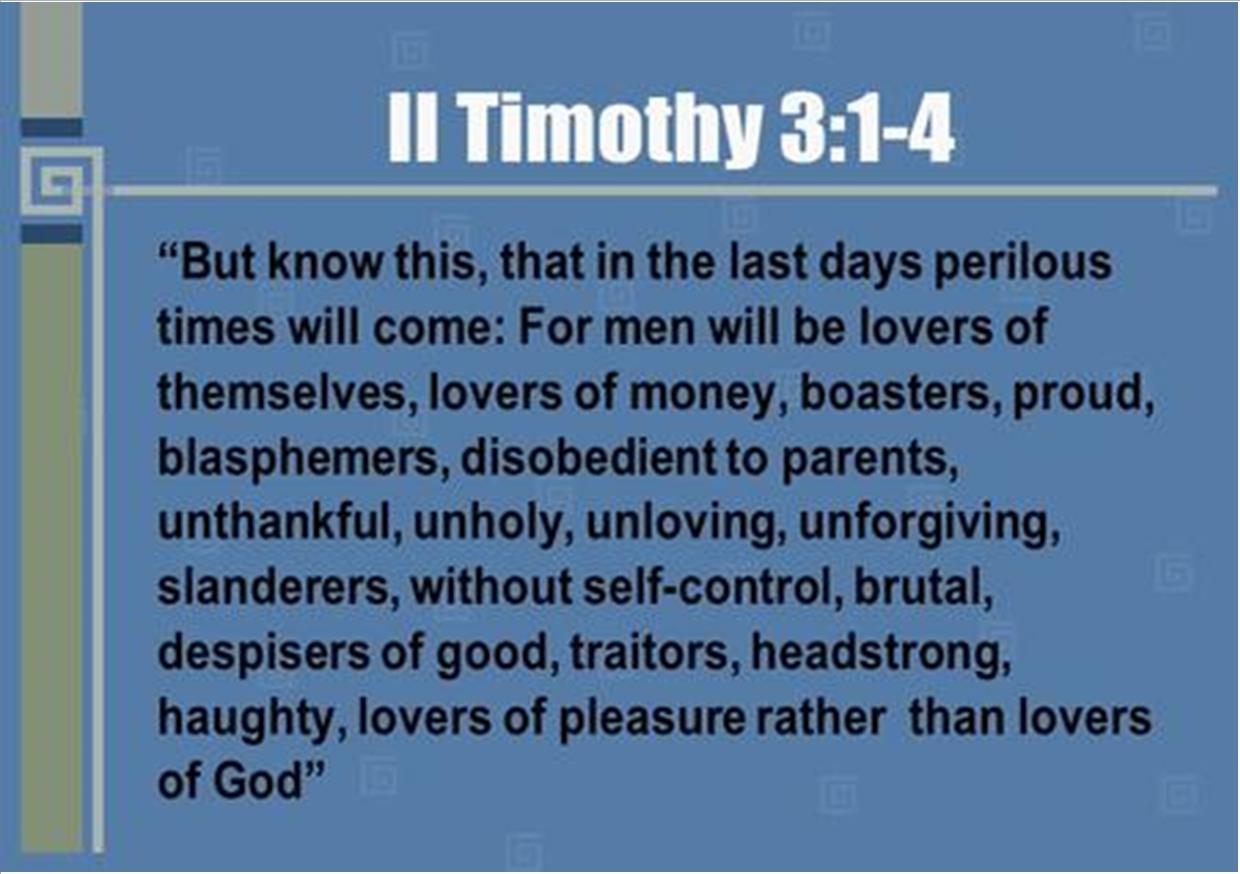A. Remember, you are reading a Pastoral Epistle of inspired ministerial advice from Paul to Timothy.
- The apostle of the Gentiles was teaching Timothy how to guide and rule the church (I Tim 3:15).
- Timothy was to take this information and spread it further by ministerial succession (II Tim 2:2).
- Paul followed his warning and exhortation to Timothy with news he was dying (II Tim 4:6-7).
- Paul needed to exhort Timothy to continue in the things Jesus had given Paul (II Timothy 3:14).
- Paul’s inspired words are superior to any seminary, council, creed, or pope (II Timothy 3:16-17).
- Any conference using Bill Hybels or Rick Warren is not only inferior, but counterproductive!
B. Though the “last days” may extend from Christ to the end of the world (Acts 2:17; Heb 1:2), Paul used that term and “perilous times” here to describe a time yet coming by virtue of the future tense; Timothy was not yet in it, so we may rightfully look for a fulfilment in history, even our generation!
C. If the blessed God described these future times as perilous, we should carefully heed the warning.
- Very dangerous; full of risk; hazardous; very harmful; dreadful; frightening; threatening; terrible; greatly to be avoided. (OED).
- It is of the greatest importance for us to properly identify what constitutes a real threat to saints.
- There are threats more dangerous than persecution and martyrdom, which instead purified saints!
- If we neglect this plain prophecy and warning, we will not be a church that pleases Jesus Christ.
- Christians respond immediately and aggressively to health or wealth perils, what about spiritual?
D. Man has ideas of what would be perilous times, but we must compare them soberly to God’s idea.
- Satan’s deceptions distract and divert Christians to get them to fight windmills instead of error.
- There is no warning here about famine, recession, war, disease, pollution, global warming, etc.
- There is no warning of cults, idolatry, witchcraft, murder, adultery, pornography, bestiality, etc.
- There is no warning here against the UN, the CFR, the USSR, UNICEF, CIA, BSA, NEA, etc.
- Satan uses the above threats to distract and discredit Christians and cause them to deny God.
- Communism and Y2K showed that many saints are distracted and diverted from the real war.
- Such fears distract saints by causing them to be vigilant and active in the wrong battle.
- Such fears discredit saints by showing the world that they do not recognize real dangers.
- Such fears deny God by apparently forgetting He is in total charge of international politics.
- The only fear a child of God should have is fear of God, Who can cast into hell (Lu 12:4-5).
- Our spiritual battle, not against flesh and blood, is the only battle (Eph 6:10-18; I Peter 2:11).
- Satan has political preachers who make fighting international conspiracies their main gospel.
E. Perilous times were a future threat – they shall come – which introduces us to their precise identity.
- The pagans of Timothy’s day already had the symptoms that follow. Paul saw something worse.
- All generations have had these sinful proclivities in natural men, so there is a much greater evil.
- The warning of future perilous times, defined as moral decline, cannot be mere worldly excess.
- The warning is against carnal Christianity, not the general sinfulness of the unbelieving world.
- Since these sins have always been, the warning must be Christianity allowing and living them.
- This is a prophetic warning of a deceitful and seductive, degenerate and dangerous Christianity.
- They would have a “form of godliness,” implying they are professing and practicing Christians.
- They would love pleasures more than God, implying they were not just worldly, godless pagans.
- They would creep into houses and lead captive silly women, yet they are not wicked kidnappers.
- They would promote much learning to these silly women, but there would be no truth learned.
- As long as there were martyrs for the truth, you did not have to worry about such Christianity.
- This situation would degenerate with evil seducers and deceivers deceiving and being deceived.
- It includes the general rejection of preaching sound doctrine for the entertaining fables of men.
- By comparing “perilous times shall come” (3:1) and “the time will come” (4:3), we must say that if this is not a prophecy of this very generation, what other generation could it possibly be?
- Paul told Timothy to turn from these men, which requires them to be a false brand of Christians, for Timothy did not need to be exhorted to turn away from pagan worldlings (II Thess 3:1-2).
- This passage, from 3:1 to 4:5, describes the rise of a compromising and effeminate Christianity.
- This passage, from 3:1 to 4:5, perfectly describes the Christianity of our times and its remedy.
- With all the love and fancy for Bible prophecy, why is there no zealous response to these words?
F. Paul has given a similar warning in two other places that manifestly pertains to Roman Catholicism.
- He told the Thessalonians of a falling away [from truth] before the man of sin (II Thess 2:1-12).
- He told Timothy of men departing from the faith to Catholic fasting and celibacy (I Tim 4:1-6).
- There is no doubt that in one way the passage before us applies to the false Christianity of Rome.
- However, by scrutiny of the passage, we can see the further degeneration to today’s Christianity.
G. In light of this threatening prophecy, saints must exhort one another often (Heb 3:12-13; 10:23-25).
I. The Christianity about to be described is unacceptable to the holy God of heaven (Heb 12:28-29).
J. The perils listed by the Spirit should be the criteria for self-examination of families and churches.
K. The perils are for Christians … they are not general perils for mankind, the world, etc., etc

